AAO-NANOS Neuro-Ophthalmology Clinical Collection: Derived from the AAO-NANOS Clinical Neuro-Ophthalmology collection produced on CD. The images are of selected cases from the NANOS teaching slide exchange, and the CD was produced under the direction of Larry Frohman, MD and Andrew Lee, MD.
The American Academy of Ophthalmology (AAO); The North American Neuro-Ophthalmology Association (NANOS).
NOVEL: https://novel.utah.edu/
TO
Filters: Collection: "ehsl_novel_aao_nanos"
| Title | Creator | Description | ||
|---|---|---|---|---|
| 201 |
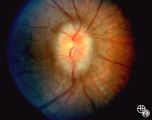 |
Systemic Disorders With Optic Nerve and Retinal Findings | Larry P. Frohman, MD | A 29-year-old African American woman presented with headaches, bilateral transient visual obscurations, blurred vision, numbness, and weakness of the lower extremities with myalgia and joint pains. She had an unplanned 12-pound weight loss over 2 months. A neurologist and internist diagnosed her wit... |
| 202 |
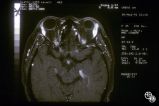 |
Systemic Disorders With Optic Nerve and Retinal Findings | Larry P. Frohman, MD | A 35-year-old African-American woman had gradual bilateral painless visual loss over 3 months. When initially seen, the visual acuities were HM OD, NLP OS. The MRI showed diffused enhancement of the optic nerves and lacrimal glands. The evaluation strongly suggested sarcoidosis, with elevated angiot... |
| 203 |
 |
Systemic Disorders With Optic Nerve and Retinal Findings | Larry P. Frohman, MD | A 35-year-old African-American woman had gradual bilateral painless visual loss over 3 months. When initially seen, the visual acuities were HM OD, NLP OS. The MRI showed diffused enhancement of the optic nerves and lacrimal glands. The evaluation strongly suggested sarcoidosis, with elevated angiot... |
| 204 |
 |
Chiasmal Syndromes | Larry P. Frohman, MD | This 36-year-old woman presented in 1988 with 3 weeks of vertical binocular diplopia. She was a known amblyope OD. Her examination was notable for a right hyperdeviation of 1 PD present in right gaze and a subtle left noncongruous homonymous field defect. She was lost to follow-up, but 5 years later... |
| 205 |
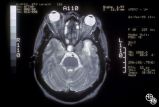 |
Chiasmal Syndromes | Larry P. Frohman, MD | This 36-year-old woman presented in 1988 with 3 weeks of vertical binocular diplopia. She was a known amblyope OD. Her examination was notable for a right hyperdeviation of 1 PD present in right gaze and a subtle left noncongruous homonymous field defect. She was lost to follow-up, but 5 years later... |
| 206 |
 |
Systemic Disorders With Optic Nerve and Retinal Findings | Larry P. Frohman, MD | Skin rashes occur in about 30 percent of patients with sarcoid. When seen, the rashes offer an accessible site for obtaining histologic material for confirmation of the clinical diagnosis. Pair with 91_68. |
| 207 |
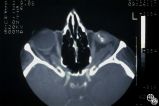 |
Ocular Manifestations of Congenital/Inherited Diseases | Larry P. Frohman, MD | On optic nerve CT scan, this patient with neurofibromatosis, type 1, shows the classic railroad-track sign of optic nerve meningioma and the kink sign of optic nerve glioma. Disease/Diagnosis: Neurofibromatosis, Type 1. |
| 208 |
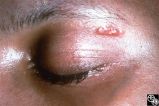 |
Systemic Disorders With Optic Nerve and Retinal Findings | Larry P. Frohman, MD | Skin rashes occur in about 30 percent of patients with sarcoid. When seen, the rashes offer an accessible site for obtaining histologic material for confirmation of the clinical diagnosis. Pair with 91_69. |
| 209 |
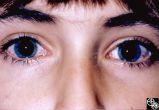 |
Ocular Manifestations of Congenital/Inherited Diseases | Larry P. Frohman, MD | This girl was 8 years old when these photographs were taken. She had been referred by pediatric neurology with ataxia. When seen, the findings of ataxia, poor convergence, early head thrusting maneuvers, and relatively preserved motility, in conjunction with the conjunctival findings as seen in the ... |
| 210 |
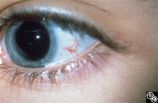 |
Ocular Manifestations of Congenital/Inherited Diseases | Larry P. Frohman, MD | This girl was 8 years old when these photographs were taken. She had been referred by pediatric neurology with ataxia. When seen, the findings of ataxia, poor convergence, early head thrusting maneuvers, and relatively preserved motility, in conjunction with the conjunctival findings as seen in the ... |
| 211 |
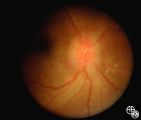 |
Systemic Disorders With Optic Nerve and Retinal Findings | Larry P. Frohman, MD | This is a 32-year-old HIV-positive man with anterior uveitis, vitritis, and bilateral papillitis from syphilis. With intravenous penicillin treatment, the optic discs and vision returned to normal. |
| 212 |
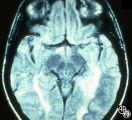 |
Magnetic Resonance Imaging in Detection of Extracranial Internal Carotid Artery Dissection | Marilyn C. Kay, MD | This 28-year-old woman presented with a 4-week history of bilateral visual loss. She had a known history of multiple sclerosis. Her vision was 20/60 OD and 20/40 OS, with an RAPD OS and optic pallor OU. Her fields and MRI are shown. Optic tract lesions usually result in an incongruous homonymous hem... |
| 213 |
 |
Neuro-Ophthalmic Case With Notable Field Changes | Marilyn C. Kay, MD | This 28-year-old woman presented with a 4-week history of bilateral visual loss. She had a known history of multiple sclerosis. Her vision was 20/60 OD and 20/40 OS, with an RAPD OS and optic pallor OU. Her fields and MRI are shown. Optic tract lesions usually result in an incongruous homonymous hem... |
| 214 |
 |
Neuro-Ophthalmic Imaging-Cerebral Angiography | Mark J. Kupersmith, MD | Ehlers-Danlos syndrome is a connective tissue disorder that may affect blood vessels and predispose some affected patients to development of carotid cavernous fistula. Most patients with high-flow direct carotid cavernous sinus fistulas have suffered acute traumatic tears in the internal carotid art... |
| 215 |
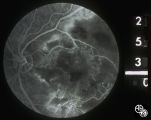 |
Neuro-Ophthalmic Consequences of Therapy | Mark J. Kupersmith, MD | radiation retinopathy may mimic diabetic or hypertensive optic neuropathy. A history of irradiation to the eye, orbit, or head is mandatory. Radiation retinopathy usually occurs many months after radiation therapy. |
| 216 |
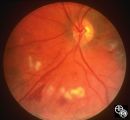 |
Neuro-Ophthalmic Consequences of Therapy | Mark J. Kupersmith, MD | Radiation causes a vascular retinopathy that may mimic diabetic or hypertensive retinopathy. It does not develop until many months or several years after radiation therapy to the eye, orbit or head. |
| 217 |
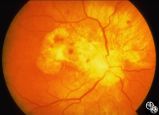 |
Isolated Optic Neuritis/Neuropathy | Mark J. Kupersmith, MD | Papilledema may produce visual loss due to chronic atrophic papilledema, secondary macular hemorrhage, exudate or edema, secondary ischemic optic neuropathy, or secondary subretinal neovascular membrane formation. Patients with papilledema and visual loss should be suspected of harboring one of thes... |
| 218 |
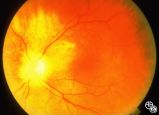 |
Isolated Optic Neuritis/Neuropathy | Mark J. Kupersmith, MD | Papilledema may produce visual loss due to chronic atrophic papilledema, secondary macular hemorrhage, exudate or edema, secondary ischemic optic neuropathy, or secondary subretinal neovascular membrane formation. Patients with papilledema and visual loss should be suspected of harboring one of thes... |
| 219 |
 |
Systemic Disorders With Optic Nerve and Retinal Findings | Mark J. Kupersmith, MD | Sarcoidosis is an inflammatory granulomatous disease that may result in inflammatory or infiltrative optic neuropathology or retinal vasculitis. Pair with 91_34. |
| 220 |
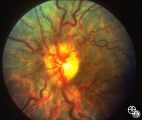 |
Systemic Disorders With Optic Nerve and Retinal Findings | Mark J. Kupersmith, MD | Sarcoidosis is an inflammatory granulomatous disease that may result in inflammatory or infiltrative optic neuropathology or retinal vasculitis. Pair with 91_35. |
| 221 |
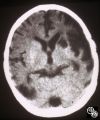 |
Neuro-Ophthalmic Vascular Disease | Mark J. Kupersmith, MD | A 9-year-old boy had recurrent ischemic episodes that had begun 2 years prior to evaluation. A significant right hemiparesis and a significant speech, learning, and memory disorder were present. His noncontrast axial view CT scan demonstrated multiple cerebral infarcts. Cerebral angiography revealed... |
| 222 |
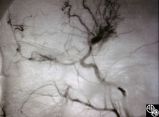 |
Neuro-Ophthalmic Vascular Disease | Mark J. Kupersmith, MD | A 9-year-old boy had recurrent ischemic episodes that had begun 2 years prior to evaluation. A significant right hemiparesis and a significant speech, learning, and memory disorder were present. His noncontrast axial view CT scan demonstrated multiple cerebral infarcts. Cerebral angiography revealed... |
| 223 |
 |
Neuro-Ophthalmic Vascular Disease | Mark J. Kupersmith, MD | A 9-year-old boy had recurrent ischemic episodes that had begun 2 years prior to evaluation. A significant right hemiparesis and a significant speech, learning, and memory disorder were present. His noncontrast axial view CT scan demonstrated multiple cerebral infarcts. Cerebral angiography revealed... |
| 224 |
 |
Neuro-Ophthalmic Vascular Disease | Mark J. Kupersmith, MD | MR angiography was performed on this 33-year-old woman, who complained of the onset of a bad taste in her mouth followed by pain along the left forehead and development of the left third-order Horner's syndrome during pregnancy. Except for the Horner's syndrome, the patient was neurologically intact... |
| 225 |
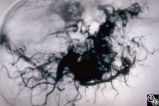 |
Ocular Manifestations of Congenital/Inherited Diseases | Mark J. Kupersmith, MD | This 9-year-old girl, who had complained of recurrent spontaneous bleeding from the palate and slight swelling and increased warmth over the left cheek, was found to have Wyburn-Mason syndrome. Image 1993_16 shows a small area of arteriovenous shunt on the left optic disc in this patient, who has no... |
